c. 476 - 1000
c. 476 - 1000
c. 1000 - 1150
c. 1125ish - c.1600ish
c. 1430 - c.1600
c.Late1300's - c.1490
c. 1490 - c. 1550
What ancient Roman building were the first Christian churches based on?
Basillica
What are two architectural features of a Romanesque Church?
semicircular arches
barrel or groin vaults to support the roof of the nave
massive piers and walls with few windows, in order to contain the outward thrust of the vaults
What are two architectural features of a Gothic Church?
pointed arches, flying buttresses, rib vault ceilings, stained glass windows with tracery
What are two visual clues that Durer's Adam and Eve isn't an attempt to tell the actual story?
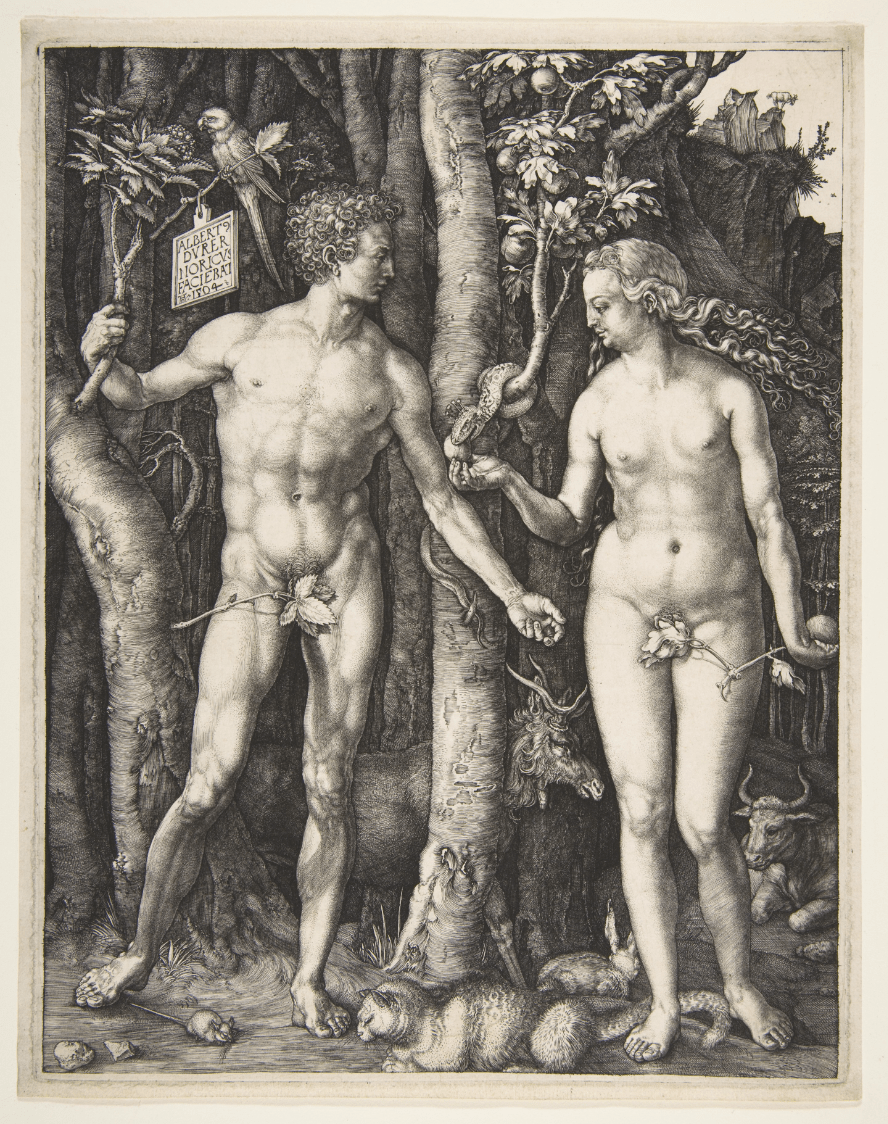
A sign in Latin announcing himself
Far from the garden evoked in Genesis, this forest is distinctly German, the dark woods of the devils and spooks of Grimm’s fairy tales.
Eve is plucking an apple from a tree with fig leaves.
A parrot, a tropical bird, perches on a branch to the viewer’s left.
What artwork from the 250 is considered "proto-Renaissance", and why?
Arena Scrovegni Chapel, Giotto's painting of the Lamentation.
Because he broke away from the traditional medieval style of painting, and was closer the the style of the early Renaissance.
Why is the Italian Renaissance divided into separate periods?
Because work changed stylistically as time passed.
What was the name of the edict, year, and emperor who accepted Christianity?
Edict of Milan in 313 CE
Emperor Constantine I
Who (whom?) does the term Theotokos refer to?
The Virgin Mary. (Theotokos is Greek for Bearer of God (Jesus)
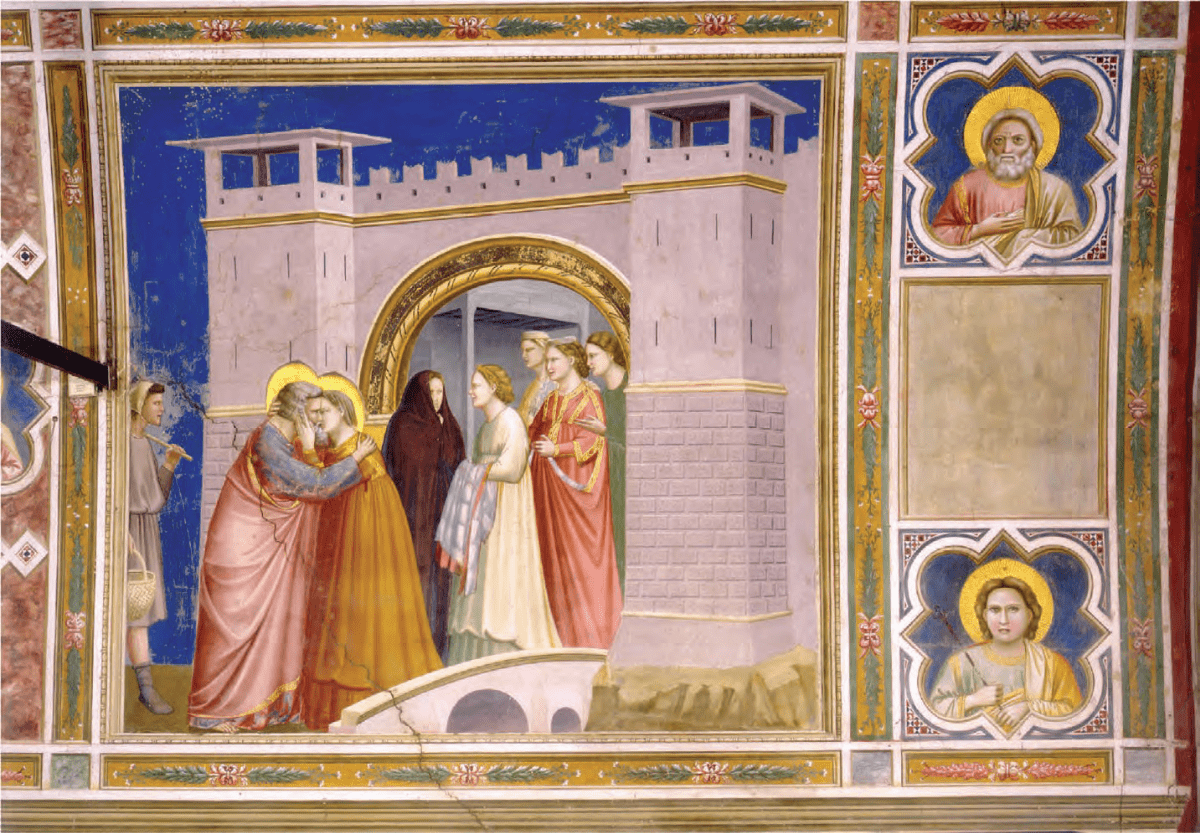
Attribution
What artist painted this?
Name the artwork by this artist that we studied in the 250.
Giotto
The Lamentation, Arena (Scrovegni) Chapel
Why don't art historians believe that the Northern art period concurrent to the Italian Renaissance should be called a "Renaissance"?
Because it wasn't a rebirth, like in Italy.
Two specific Renaissance ideas helped this controversial nude female figure to be accepted in this artwork.
What were they?
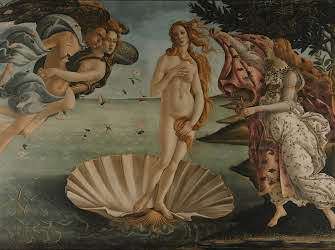
The "rebirth" of ancient Greek classical statues, and Neoplatonism - creating a more universal philosophy combination of ancient cultures mythologies, along with other religions
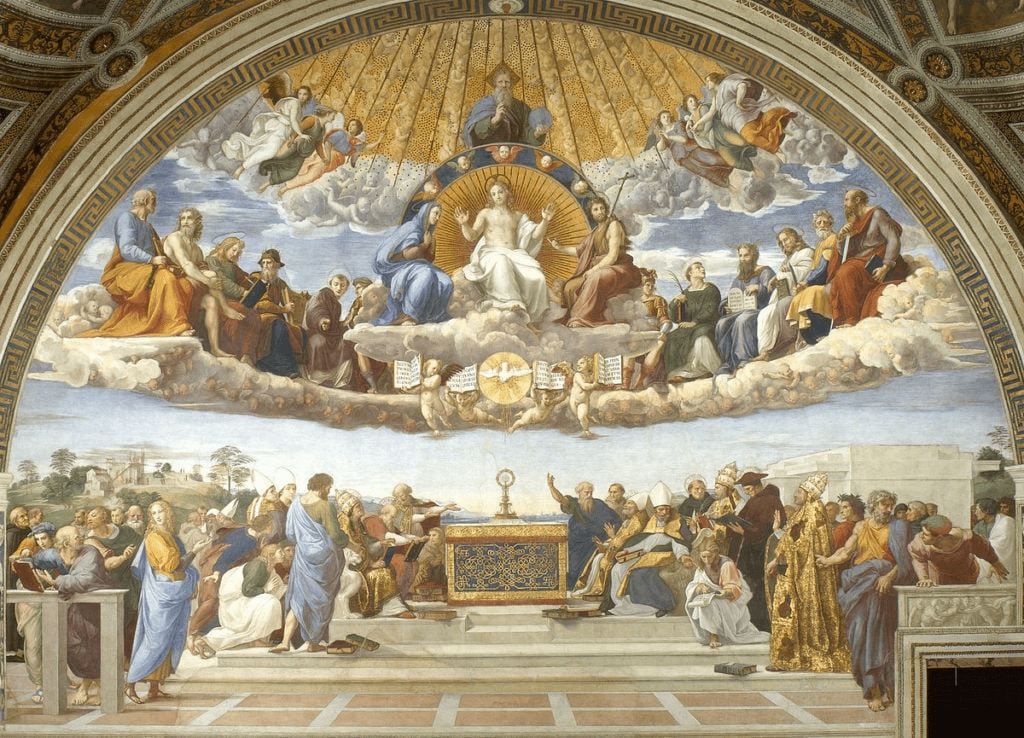
Attribution
Which artist from the Renaissance painted this, and what two visual similarities identifies who made it?
The one point perspective
The giant arch
People dressed in ancient Greek togas
Approximately symmetrical composition
What innovation was created to support a dome built on top of a square base? (First used in Hagia Sophia's dome)
Pendentives
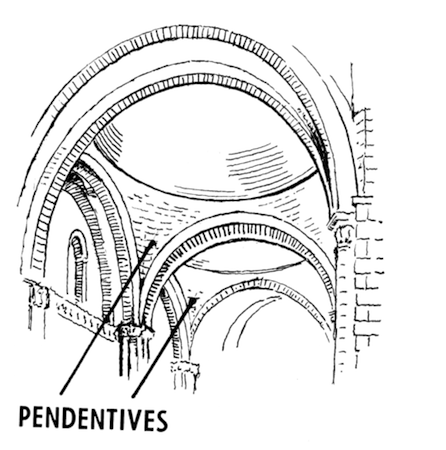
Why was this period called Romanesque?
Because of the architecture of the time period which is based on Roman architectural elements, particularly the rounded Roman arch.
Explain the two purposes of flying buttresses.
To let in more light
To support the higher ceilings of Gothic churches
Name and fully identify this artwork.
Why is Jesus shown with pustules all over his skin, and what is the name of the disease?

Monks treated skin diseases, such as ergotism. The image of the crucified Christ is pitted with plague-type sores, showing patients that Jesus understood and shared their afflictions. The graphic portrayal of the depictions of medical conditions was unusual in the history of European art.
Which early Renaissance statue became a political symbol of the city state Florence, and why?
Donatello's David
Florence citizens intended to defend itself with force and intelligence. There was no better symbol of their determination than David overcoming Goliath.
What is the main purpose of Raphael's School of Athens, and who are the two figures in the middle?
What was the name and function of the underground passageways Christians used until 313 CE? (from the 250)
Why did Christians have to use them?
Catacombs of Priscilla, tombs
Because they were persecuted up until 313 CE.
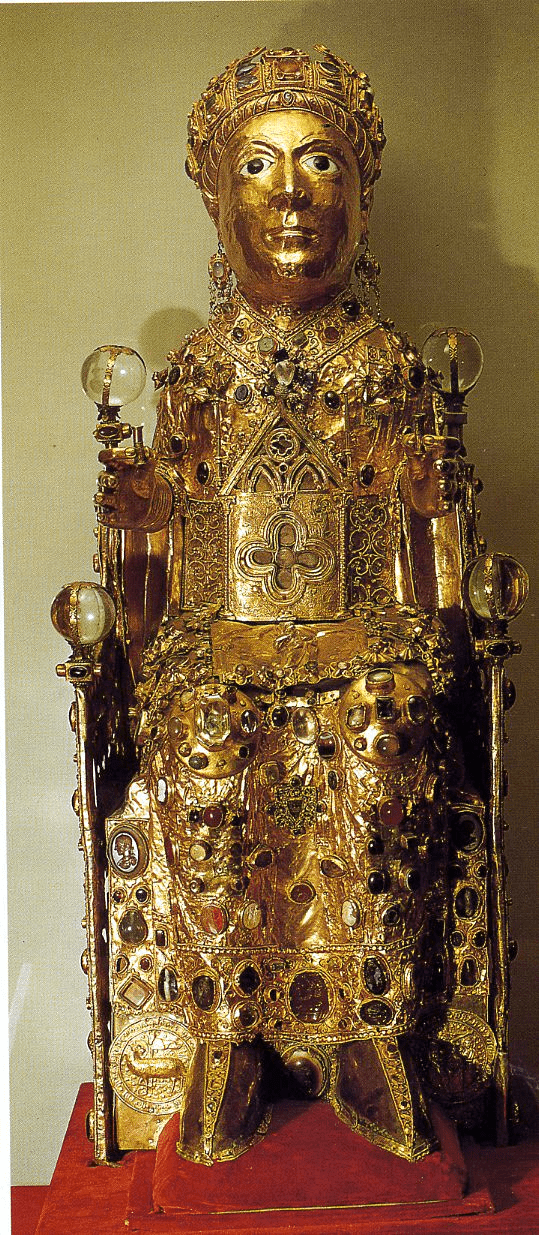
What is the name of this statue?
Define reliquary
Where did the precious stones on this statue come from?
The Reliquary of St Foi
A container for the ashes of someone
Pilgrims brought precious stones to add to it.
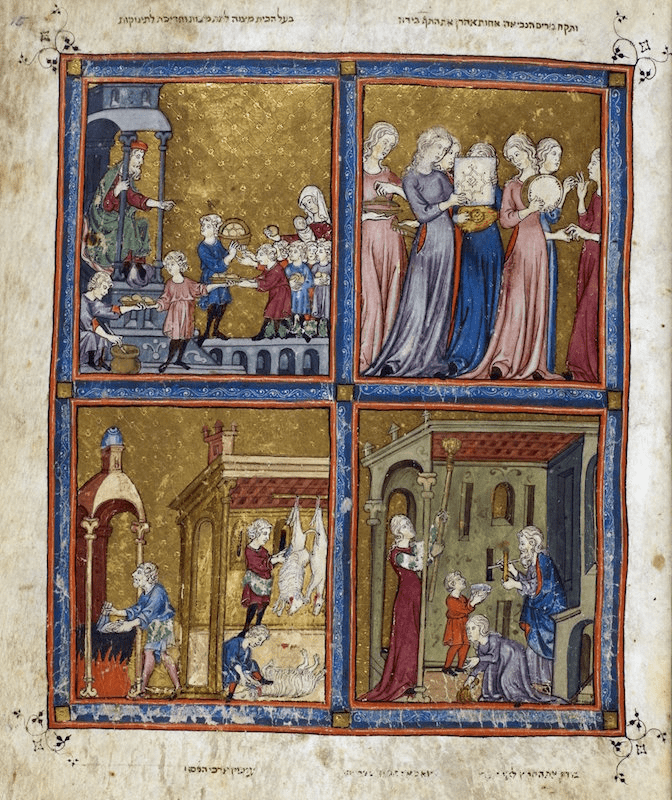
What book is this artwork from?
Why did Jewish people believe it was acceptable to use icons in this book?
The Golden Haggadah
Because it's educational - used to teach children the story of Passover.
What are 2 debates regarding symbolism in the Arnolfini Portrait?
Whether Ms. Arnolfini is dead or alive at the time of the portrait.
Whether her hands are holding the extra material of her dress in a current style, or whether she is pregnant.
Whether the oranges symbolize wealth, or the Garden of Eden.
Explain:
1. The connection between the Delphic sibyl and Christianity.
2. The philosophy that made it acceptable to include ancient Greek mythological figures in a Catholic church, in an attempt for more universal communication.
1. She foretold the coming of Jesus Christ.
2. Neo-platonimsm
What was the main difference in Michelangelo's style in the 25 years between the Sistene ceiling and the Last Judgement? (Altar wall)
It was much darker in mood.
Define iconography, iconoclasm and iconoclast.
Religious images (humans, animals, and mythical creatures)
Attacking/destroying religious images because they think the images are heretical.
A person who does the above.
1.Describe the materials or techniques used to create the Bayeux Tapestry.
2.Describe a historical event depicted in the Bayeux Tapestry.
1. The Bayeux Tapestry is made of of linen cloth and wool yarn.
· The cloth is embroidered or stitched with wool yarn dyed in eight different colors.
· The woven cloth is cut and sewn into a long, horizontal wall hanging.
2. Harold of Wessex swears an oath to support William, Duke of Normandy (also known as William the Conqueror).
· Harold breaks the oath to William and has himself crowned as the king of England after the death of Edward the Confessor.
· Upon hearing of Harold’s betrayal, William and his half-brother Bishop Odo make battle preparations to invade England.
· After arriving on the south coast of England, the Normans defeat the English in the Battle of Hastings of 1066; Harold is killed in the combat.
Name a pilgrimage site from the 250 that is a Gothic church.
Name any three other pilgrimage sites from the 250, and what relic is at each one that people go to see?
Chartres - Virgin Marys tunic
St Foi - the reliquary of St Foi
Chavín de Huántar in Peru - the location is believed to be spiritually important.
The Kaaba, Saudi Arabia - hajj - the journey to Mecca
Jowo Rinpoche, Tibet - the Buddha
List three differences between Italian Renaissance artists, and the Northern artists of the same time.
Ren artists interested in creating "rational space" - using linear and atmospheric perspective. northern artists were more interested in capturing all the minute details, not in perspective.
Ren artists: Learning from and including classical references in their art. Being geographically further from Rome, Northern artists weren't as influenced by that.
Oil paint came to the North first, which allowed artists to create more realistic shiny and glowing textures like metal and glass glazes.
Explain Neo-platonism, and why it was important in Renaissance Art.
Name and fully identify an artwork that embodies this philosophy.
The philosophical instinct in the Italian Renaissance was to synthesize thought systems, to find a common, universal philosophy with a broad range of human thought.
This made it acceptable to use Greek and Roman mythology in religious art, also to use other cultures/religions philosophies.
Michelangelos Sistene Chapel ceiling
The Birth of Venus
Venus of Urbino
Explain Humanism
Humanity’s capacity to achieve greatness through knowledge and free will.
Looked to ancient Greece and Rome's examples.
Ren. artists learned the principles of harmony, symmetry, and perspective by viewing Rome's ancient ruins and statuary firsthand.